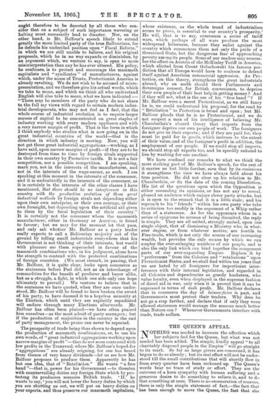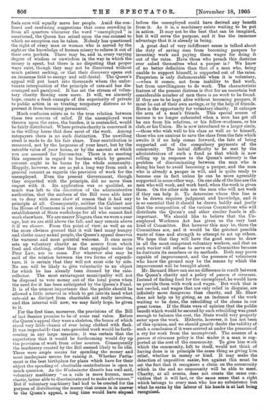feels sure will equally move her people. Amid the con-
fused and confusing suggestions that come crowding in from all quarters whenever the word " unemployed " is mentioned, the Queen has seized upon the one counsel to which no exception can betaken. Nobody has questioned the right of every man or woman who is moved by the sight or the knowledge of human misery to relieve it out of their own pockets. There may be, and is, every varying degree of wisdom or unwisdom in the way in which the money is spent, but there is no disputing that proper ways exist, though they may not be discovered without much patient seeking, or that their discovery opens out an immense field to energy and self-denial. The Queen's appeal will put heart into thousands whom the unfor- tunate interposition of the principle of rate-aid has dis- couraged and paralysed. It has set the stream of volun- tary charity flowing once more. It will, we sincerely hope, create a fresh example of the superiority of private to public action in so treating temporary distress as to prevent it from becoming permanent.
Much confusion exists as to the true relation between these two sources of relief. If the unemployed were thrown upon the rates, the burden, it is contended, would be fairly distributed. Where private charity is concerned it is the willing horse that does most of the work. Among ratepayers there is no such distinction. The unwilling steed is made to do his fair share. Your contribution is measured, not by the largeness of your heart, but by the rateable value of your house, or by the amount at which you are assessed for Income-tax. There is no meeting this argument in regard to burdens which by general consent ought to be borne by the whole community. Happily, however, we are as yet a long way from such a general consent as regards the provision of work for the unemployed. Even the present Government, though they coquetted with the principle, did no more than coquet with it. Its application was so qualified, so much was left to the discretion of the administrative authorities, that the authors of the Bill were able later on to deny with some show of reason that it had any principle at all. Consequently, neither the Cabinet nor the House of Commons is yet committed to the universal establishment of State workshops for all who cannot find work elsewhere. We are nearer Niagara than we were a year ago, but we are still above the fall, and may remain above it if we choose. From this point of view, as well as on the more obvious ground that it will feed many hungry and clothe many naked people, the Queen's appeal deserves the warmest and most grateful welcome. It once more sets up voluntary charity as the source from which food and clothing, other than that supplied under the Poor Law, are to come. For whatever else may be said of the relation between the two forms of expendi- ture, it is certain that they will not exist side by side. No one will be likely to give voluntarily to an object for which he has already been dunned by the rate. collector. The most extravagant municipality will not be disposed to vote money out of the local purse when the need for it has been anticipated by the Queen's Fund. It is of the utmost importance that the public should be allowed a little interval in which to get into its head what rate-aid as distinct from charitable aid really involves, and this interval will now, we may fairly hope, be given to it.
For the first time, moreover, the provisions of the Bill of last Session promise to be of some real value. Before the Queen's appeal they were a skeleton, the bones of which stood very little chance of ever being clothed with flesh. It was improbable that rate-provided work would be forth- coming in any large measure; it was certain that the expectation that it would be forthcoming would dry up the provision of work from other sources. Consequently the machinery created by the Bill seemed likely to lie idle. There were ample means for spending the money and most inadequate means for raising it. Whether Parlia- ment is the best birthplace for plans which have for their object the spending of charitable contributions is open to much question. As the Westminster Gazette has well said, voluntary machinery "as a rule is more human, more elastic, better able to discriminate and to make allowances." But if voluntary machinery had had to be created for the purpose of distributing the money that comes in in answer to the Queen's appeal, a long time would have elapsed. in action. It may not be the best that can be imagined, but it will serve the purpose, and it has the immense advantage that it is already in being.
A great deal of very indifferent sense is talked about the duty of saving men from becoming paupers by inventing work and paying them wages for doing it • out of the rates. Have those who preach this doctrine ever asked themselves what a pauper is ? We know of no better definition than that of a man who, being unable to support himself, is supported out of the rates. Pauperism is only dishonourable when it is voluntary, —when it comes, not from inability to find, work, but from unwillingness to do work. The characteristic feature of the present distress is that for an uncertain but considerable number of men there is no work to be found. If they are to be kept alive without becoming paupers, it' must be out of their own savings, or by the help of friends. Here is the opportunity for voluntary charity.. It enlarges the area of a man's friends. This special source of income is no longer exhausted when a man has got all he can from his relatives, or his fellow-workmen, or his club, or his Union. He is now introduced to a larger circle, —those who wish well to his class as well as to himself, those who are anxious to save the class from the fate which awaits it if no help comes forward, the fate of being supported out of the compulsory payments of the community. The initial difficulty to be met by the administrators of such a fund as that which is now rolling up in response to the Queen's entreaty is the problem of discriminating between the man who is doing his best to avoid becoming a pauper, and the man who is already a pauper in will, and is quite ready to become one in fact unless he can be more agreeably supported in some other way. On one side of the line are the men who will work, and work hard, when the work is given them. On the other side are the men who will not work if they can help it. To determine where this line is to be drawn requires judgment and knowledge, and it is so essential that it should be drawn boldly and justly that the composition of the various Committees who will distribute the Queen's and other similar funds is all- important. We should like to believe that the Un- employed Workmen Act has given us the very best kind of Committee. But however this may be, there the Committees are, and it would be the greatest possible waste of time and strength to attempt to set up others.
We hope that they will have the good sense to draw in all the most competent voluntary workers, and that no such worker will refuse to serve on a Committee because he distrusts its members or its methods. Both may prove capable of improvement, and the presence of volunteers who know the ground may be the means by which the improvement will be brought about.
Mr. Bernard Shaw can see no difference in result between the Queen's charity and a policy of pawm et eireenses.
Instead of finding food for the unemployed, he would have us provide them with work and wages. But work that is not needed, and wages that are only relief in disguise, are infinitely more dangerous than charity, and Mr. Shaw does not help us by giving, as an instance of the work . waiting to be done, the rebuilding of the slums in our great towns. If the State were of opinion that the public benefit which would be secured by such rebuilding was great enough to balance the cost, the State would very properly enter upon the work. Hitherto, however, it has not been of this opinion, and we should greatly doubt the validity of such a conclusion if it were arrived at under the pressure of a cry for work from the unemployed. The essence of a pane2n et eireenses policy is that under it a man is sup- ported at the cost of the community. To give him work which the community, left to itself, would not think of ;having done is in principle the same thing as giving him. .relief, whether in money or kind. It may make the detection of imposition easier, but against this must be 'set the fact that it recognises a claim on the community which in the end no community will be able to meet. Charity, at all events, does not create the same con- viotion that it will last, or the same sense that a right, which belongs to every man who has no subsistence but .what he earns by the labour of his hands is at last being reeognised.



































































 Previous page
Previous page